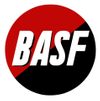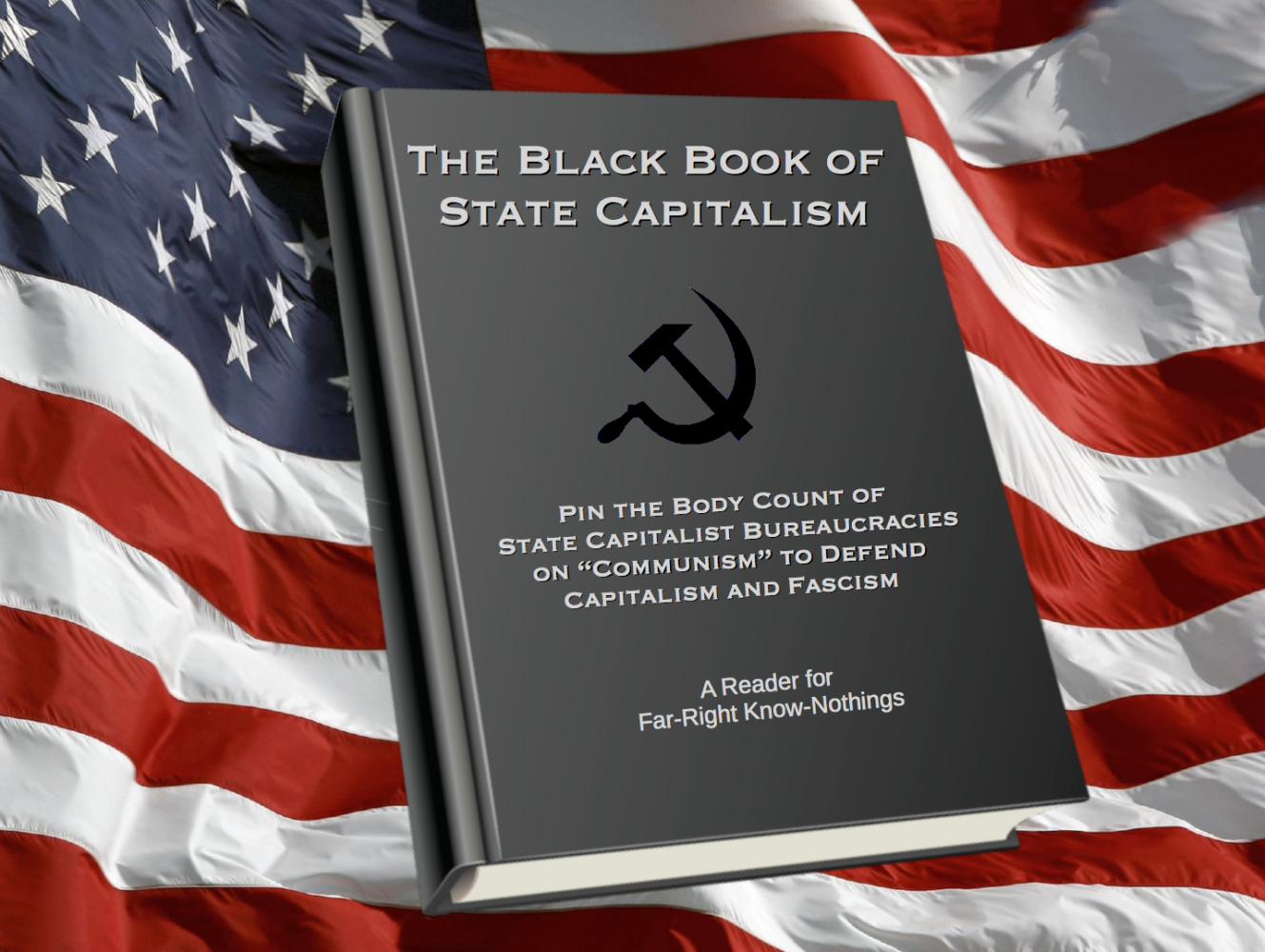
A couple of excerpts from the work of scholars of fascism against the notion that the fascists were socialists.
Anyone who has ever argued in person or online with Republican, alt-right, fascist, white nationalist, or the myriad overlapping identities of the Right today will recognize a few standard ahistorical moves they use to “win debates.” One is to bring out the “Black Book of Communism” whereby the body counts of state-capitalist, Stalinist, and Maoist, regimes are held up to show that “communism” has killed elevendy jillion people while capitalism has saved an equal amount, and simultaneously spread freedom, democracy, and wealth. The intent is never really to criticize these (state capitalist) regimes, but to prove capitalism is the only possible system a sane person would choose. A supporting argument notes that “capitalism is human nature” so stop pretending anyone who was not brainwashed by cultural Marxists at the University has a legitimate gripe with it. The vast majority of the people defending capitalism as freedom cannot tell you how capitalism works.
Especially popular these days are what I think of as the “mirror world” arguments. In our world we know capitalism is a system in which a ruling/owning class expropriates the surplus value of the labor power of the working class. Capitalism is a redistribution of value and wealth upward to a small dominating class. In mirror world, genius entrepreneurs and business people are “creatives,” “job creators” and “risk takers” whose “work” creates all wealth. The rest of us benefit from the hard work of this “John Galt” class. If you work hard you can be a boss someday, or a useful person like Kylie Jenner or Steve Jobs. Socialists “spend other people’s money” so they can drive the economy into the ground by giving out free stuff no one earned. It’s the people in urban areas, illegal immigrants, spoiled college students, feminists, and intellectuals who contribute nothing to society who get in the way of the normal functioning of such a perfect system.
Coming back to the subject of fascism, today the mirror world arguments depict antifa as violent thugs attacking peaceful marchers who only wanted to celebrate free speech. Antifa, or anyone in the street confronting white-nationalist wildings are the “real fascists.” Stormfronters, KKK, American Guard, Sons of Odin, Proud Boys, Rise Above Movement, White Aryan Resistance, Identity Evropa, Patriot Prayer and other groups who, together, mobilize fighting units to attack cities, terrorize and beat leftists, and demonize immigrants while calling for their deaths, are the Enlightened pro-democracy forces pushing against censorship and for civility. And aren’t the Proud Boys multi-ethnic, thereby proving they can’t be fascists? Never mind that Imperial Japan’s leaders were fascist, or that today’s Hindutva nationalists in India are fascists. Proud Boy Tiny Toese is Samoan! Who cares that he wears a “Pinochet Did Nothing Wrong” shirt? The “Right Wing Death Squad” line of clothing, is of course also not fascist in any way. “Pinochet killed zero people because communists aren’t people” is the Proud Boy line. If you see interviews with Proud Boy fighters, they usually portray themselves as under attack by hysterical communists, with themselves in the familiar Chris Kyle (“American Sniper") role of the “sheep dog” fighting off the wolves to protect the herd (good, normal, Americans).
One of the most popular mirror world arguments posits that fascism has always been a leftist movement, anti-capitalist, and even socialist. These arguments often cite Nazi rhetoric used to appeal to the working class in the 1930s (and Trump also appeals to them today) from speeches on “the workers” or against bankers. They also like to bring up that Mussolini was a socialist (but leave out the part where he rejected socialism for nationalism) as evidence that fascism has always been socialist.
Here is Dinesh D’Souza whose anti-historical “research” often reads like a manifesto from a mass shooter, cherry picking data from left and right sources to make completely unhinged arguments:
“But the most notable thing about, not only Mussolini’s Black Shirts, but about the National Socialists in Germany is that above all, They. Were. Socialists! They were socialists. Mussolini started out as a Marxist. He was the editor of the socialist journal in Italy. And so again, on the issue of fascism, in the 1930s and 40s, fascism and Nazism were widely understood to be left wing. They were understood that way by Mussolini, by Hitler, they were understood that way by FDR and by the New Deal. They were understood that way by reporters writing about the period. But after World War II a very interesting thing happens. Fascism becomes right wing. Right wing. This I want to suggest is another big lie. It is essentially the result of a kind of an intellectual sleight of hand in which after the war, when the horrors of National Socialism are now manifest for the world to see it becomes imperative to move fascism into the right wing column and pretend like it was some sort of excrescence of capitalism. That fascism was some sort of invention of the business community. Whereas in reality it arose out of an argument within socialism.”
-Dinesh D’Souza, “Socialism Into Fascism - The Left Is And Always Was The Problem” from Youtube https://www.youtube.com/watch?v=8jPaq86OnJs
So I thought it might be useful just to post what a couple of historical scholars of fascism have to say about whether fascism is either anti-capitalist or socialist. I don’t expect people on the far right to be persuaded by historically grounded arguments, but with such grounded sources, those on the left can better define our own goals in opposition to fascism and its progenitor, capitalism.
Excerpt from Robert O. Paxton’s The Anatomy of Fascism:
Another supposed essential character of fascism is its anticapitalist, antibourgeois animus. Early fascist movements flaunted their contempt for bourgeois values and for those who wanted only “to earn money, money, filthy money." They attacked “international finance capitalism" almost as loudly as they attacked socialists. They even promised to expropriate department-store owners in favor of patriotic artisans, and large landowners in favor of peasants.
Whenever fascist parties acquired power, however, they did nothing to carry out these anticapitalist threats. By contrast, they enforced with the utmost violence and thoroughness their threats against socialism. Street fights over turf with young communists were among their most powerful propaganda images. Once in power, fascist regimes banned strikes, dissolved independent labor unions, lowered wage earners’ purchasing power, and showered money on armaments industries, to the immense satisfaction of employers. Faced with these conflicts between words and actions concerning capitalism, scholars have drawn opposite conclusions. Some, taking the words literally, consider fascism a form of radical anticapitalism. Others, and not only Marxists, take the diametrically opposite position that fascists came to the aid of capitalism in trouble, and propped up by emergency means the existing system of property distribution and social hierarchy.
This book takes the position that what fascists did tells us at least as much as what they said. What they said cannot be ignored, of course, for it helps explain their appeal. Even at its most radical, however, fascists’ anticapitalist rhetoric was selective. While they denounced speculative international finance (along with all other forms of internationalism, cosmopolitanism, or globalization—capitalist as well as socialist), they respected the property of national producers, who were to form the social base of the reinvigorated nation. When they denounced the bourgeoisie, it was for being too flabby and individualistic to make a nation strong, not for robbing workers of the value they added. What they criticized in capitalism was not its exploitation but its materialism, its indifference to the nation, its inability to stir souls. More deeply, fascists rejected the notion that economic forces are the prime movers of history. For fascists, the dysfunctional capitalism of the interwar period did not need fundamental reordering; its ills could be cured simply by applying sufficient political will to the creation of full employment and productivity. Once in power, fascist regimes confiscated property only from political opponents, foreigners, or Jews. None altered the social hierarchy, except to catapult a few adventurers into high places. At most, they replaced market forces with state economic management, but, in the trough of the Great Depression, most businessmen initially approved of that. If fascism was “revolutionary," it was so in a special sense, far removed from the word’s meaning as usually understood from 1789 to 1917, as a profound overturning of the social order and the redistribution of social, political, and economic power. (Paxton. The Anatomy of Fascism, P.10-11)
Excerpt from Ian Kershaw’s The Nazi Dictatorship dealing with the continuity of the class system under Nazis:
The emphasis has, therefore, been far more heavily laid upon the essential continuities in the class structure of Nazi Germany, rather than upon incisive changes.
Schoenbaum himself had accepted that the social position of the elites remained relatively unscathed down to the last phase of the war. He may, however, have rather exaggerated the extent of the fluidity in social structures and the amount of upward mobility which took place. Of course, it is true that thrusting, energetic, ruthless, and often highly efficient ‘technocrats of power’ such as Heydrich or Speer pushed their way to the top. And the war certainly accelerated changes in the high ranks of the Wehrmacht. But the new political elite co-existed and merged with the old elites rather than supplanting them.
Non-Party preserves such as big business, the civil service, and the army recruited their leadership for the most part from the same social strata as before 1933. Education remained overwhelmingly dominated by the middle and upper classes. The most important and powerful Party affiliation, the SS, recruited heavily from the elite sectors of society. If the traditional ruling class had to make some room for social upstarts from lower ranks of society who had gained advancement through positions of power and political influence, such changes amounted to little more than a slight acceleration of changes already perceptible in the Weimar Republic.
At the other end of the social scale, the working class-- deprived of a political voice, its social gains of the Weimar Republic reversed, and exposed in the shadow of mass unemployment to the brutal exploitation of employers backed by the repressive apparatus of the police state-- had its living standard reduced in the first years of the Third Reich even from the lowly level of the depression era. The slight rise in real wages in the later 1930s was a by-product of the armaments boom, and was accompanied by intensified pressure-- physical and mental-- upon the industrial workforce. The class position of workers remained basically unchanged into the middle of the war-- except that the most extreme exploitation now fell upon foreign workers.
The most significant changes in the nature and composition of German labour occurred in the last phase of the war and were, in the main, the consequences of military service, losses at the Front, destruction of industries, dislocation of the workforce, evacuation and homelessness, and ultimately foreign conquest. Whatever changes had taken place by 1945 were, therefore, a product of Nazism’s collapse more than of its policies while in power. (Ian Kershaw, Nazi Dictatorship, 175-176)


